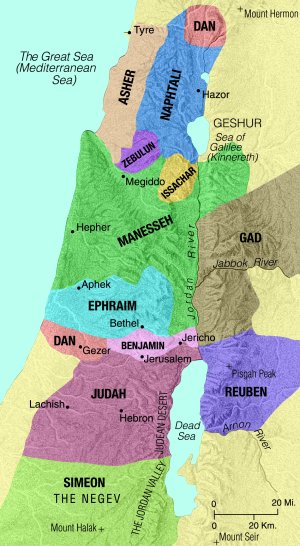- Joined
- May 27, 2023
- Messages
- 8,789
- Reaction score
- 8,228
- Points
- 175
- Faith
- Christian/Reformed
- Country
- US
- Politics
- conservative
This thread concerns only one aspect of dispensationalism, and that is the teaching that the thousand years in Revelation is a literal thousand years. And that during that thousand years, Jesus is reigning in Jerusalem; that it is a time when the church has been removed and God is dealing with geo/politcal Israel, fulfilling all the promises made to Israel in the OT, including possession of the land and a complete restoration of national Israel.
The question is: How do you deal with these passages concerning the land?
After Solomon had built the temple and his own house, prayed concerning it and the people of Israel, God appeared to him and spoke to him. This is in 1 Kings 9: 1-9.
9 As soon as Solomon had finished building the house of the Lord and the king’s house and all that Solomon desired to build, 2 the Lord appeared to Solomon a second time, as he had appeared to him at Gibeon. 3 And the Lord said to him, “I have heard your prayer and your plea, which you have made before me. I have consecrated this house that you have built, nby putting my name there forever. oMy eyes and my heart will be there for all time. 4 And as for you, if you will pwalk before me, qas David your father walked, with integrity of heart and uprightness, doing according to all that I have commanded you, and keeping my statutes and my rules, 5 rthen I will establish your royal throne over Israel forever, as I promised David your father, saying, ‘You shall not lack a man on the throne of Israel.’ 6 sBut if you turn aside from following me, you or your children, and do not keep my commandments and my statutes that I have set before you, but go and serve other gods and worship them, 7 tthen I will cut off Israel from the land that I have given them, uand the house that I have consecrated for my name I will cast out of my sight, vand Israel will become a proverb and a byword among all peoples. 8 And this house will become a heap of ruins.1 Everyone passing by it will be astonished and will hiss, and they will say, w‘Why has the Lord done thus to this land and to this house?’ 9 Then they will say, ‘Because xthey abandoned the Lord their God who brought their fathers out of the land of Egypt and laid hold on other gods and worshiped them and served them. Therefore the Lord has brought all this disaster on them.’ ”
1 Kings 10:6-8
So Solomon did what was evil in the sight of the Lord and did not wholly follow the Lord, as David his father had. Then Solomon built a high place for Chemosh the abomination of Moab, and for Molech the abomination of the Ammonites, on the mountains east of Jerusalem. And so he did for all his foreign wives, who made offerings and sacrifices to their god's.
The question is: How do you deal with these passages concerning the land?
After Solomon had built the temple and his own house, prayed concerning it and the people of Israel, God appeared to him and spoke to him. This is in 1 Kings 9: 1-9.
9 As soon as Solomon had finished building the house of the Lord and the king’s house and all that Solomon desired to build, 2 the Lord appeared to Solomon a second time, as he had appeared to him at Gibeon. 3 And the Lord said to him, “I have heard your prayer and your plea, which you have made before me. I have consecrated this house that you have built, nby putting my name there forever. oMy eyes and my heart will be there for all time. 4 And as for you, if you will pwalk before me, qas David your father walked, with integrity of heart and uprightness, doing according to all that I have commanded you, and keeping my statutes and my rules, 5 rthen I will establish your royal throne over Israel forever, as I promised David your father, saying, ‘You shall not lack a man on the throne of Israel.’ 6 sBut if you turn aside from following me, you or your children, and do not keep my commandments and my statutes that I have set before you, but go and serve other gods and worship them, 7 tthen I will cut off Israel from the land that I have given them, uand the house that I have consecrated for my name I will cast out of my sight, vand Israel will become a proverb and a byword among all peoples. 8 And this house will become a heap of ruins.1 Everyone passing by it will be astonished and will hiss, and they will say, w‘Why has the Lord done thus to this land and to this house?’ 9 Then they will say, ‘Because xthey abandoned the Lord their God who brought their fathers out of the land of Egypt and laid hold on other gods and worshiped them and served them. Therefore the Lord has brought all this disaster on them.’ ”
1 Kings 10:6-8
So Solomon did what was evil in the sight of the Lord and did not wholly follow the Lord, as David his father had. Then Solomon built a high place for Chemosh the abomination of Moab, and for Molech the abomination of the Ammonites, on the mountains east of Jerusalem. And so he did for all his foreign wives, who made offerings and sacrifices to their god's.


